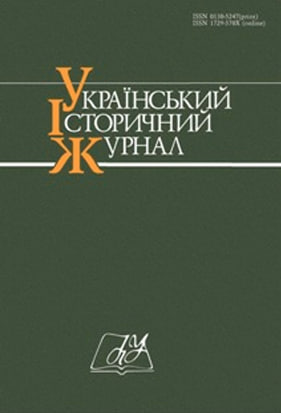Shaping Ukraine-Great Britain Information Space on the Eve of World War I
DOI:
https://doi.org/10.15407/uhj2022.03.081Keywords:
Ukraine, Great Britain, Ukrainian issue, Ukrainian Information Committee, Anglo- Ukrainian Committee, information spaceAbstract
This paper is an overview of the political and governance toolkit of the Ukrainian intelligentsia for effective outreach strategy in terms of promoting Ukraine in the British public space on the eve of World War I. An available research includes essential background information for triggering relevant institutions and public relations tools that facilitated the process of putting Ukraine on the map of the UK public space.
The methodology. Theoretical framework lies in an ample and detailed vision of the empirical historical approaches to displaying a vivid tapestry of a sound understanding of a discursive field, the subject – media landscape in terms of trends and good practices, which is fundamental to any outreach and engagement.
Scientific novelty. The pivotal focus that presupposes the novelty of our investigation revolves around the importance of the Ukrainian public figures’ aspirations to bridge the gap between the Ukrainian and British academia and media representatives as well as around a wide range of involved communicative tools of influence on shaping the UK audience stance towards Ukraine. It should be articulated that the efficacy of such a toolkit was a prerequisite of extracting the information from science and literary sources that eventually transformed into politically biased journalism. For this purpose, we employed survey data collected from the Ukrainian and English-language press. Data also revealed a significant factor of undertaking a wide-ranging campaign of systemic circulation of publications about Ukraine in the British press and its operative reverse on the pages of the Ukrainian printed periodicals. Of particular interest for our study are the works of W.R.Morfill, Great Britain’s first scholar in Ukrainian studies as well as significant contributions made by V.Lypynskyi and V.Stepankivskyi into the Ukrainian Information Committee (Lviv) into propaganda activities on reaching GB audience.
Conclusions. Findings revealed the topicality of the research and proved that on the eve of the World War I the Union for the Liberation of Ukraine had launched Great Britain-oriented propaganda, international outreach and publishing, therefore, informing Europe about the events in Ukraine. The paradigm of Ukraine’s positioning implied the concept that anti-democratic Russia should not be considered an ally of Great Britain, instead emphasizing on the geopolitical benefits of recognizing an independent Ukrainian state. Noteworthy, Ukraine failed to implement the political toolkit of highlighting the ‘Ukrainian Issue’ in GB, however, it managed to make a breakthrough in the British media landscape to reach the public and shape their opinion on Ukraine. The integration of a new national agenda into the British media space, with an emphasis on the political content of the Ukrainian independence movement, was feasible owing to the British liberalism perception of the national movement of stateless peoples in the Russian and Austro-Hungarian Empires as an indispensable part of the democratization of Europe.


